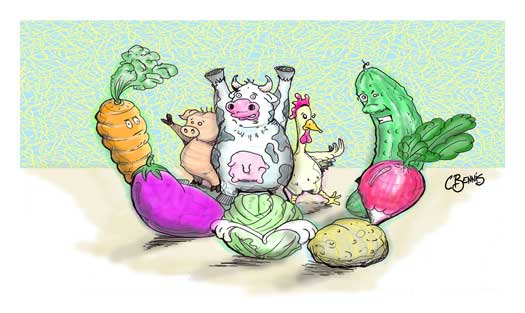Illustration by Chuck Bennis
Lose weight. Get fit. Be more active. Eat healthier. These are easily some of the most common New Year’s resolutions every year—and probably the most failed. Instead of resolving to lead a healthier lifestyle just for the sake of losing weight, why not do something that not only positively affects your health, but also the health of the environment by reducing your carbon footprint? A lifestyle sweeping large metropolitan areas and coastal regions has a growing number of Americans leading healthier way of life by eating less meat in their daily diet."
Numerous studies have consistently found that vegetarians and vegans are, on average, thinner than comparable non-vegetarians are, and on average vegetarians have a body mass index about 1kg/m2 lower than that of comparable non-vegetarians, according to a report in “Vegetarian Nutrition.”
When starting to eat a strictly vegetarian diet, you should begin to see a little weight loss within the first week or so. It is common to lose about one pound per week until you approach your ideal weight and reach a plateau. To help things along, keep oily foods — french-fries, peanut butter, salad dressings— to a minimum.
Perhaps one of the most convincing arguments – and the most important thing to consider about vegetarianism – are the health benefits, especially in today’s fast-food society. The American Dietetic Association states that appropriately planned vegetarian diets are healthful, nutritionally adequate and provide health benefits in the prevention and treatment of certain diseases. Vegetarians do need to watch intake of certain nutrients such as protein, calcium, vitamin B 12, iron and zinc since these nutrients are mainly found in meat and milk products.
According to Neal Bernard, M.D., a member of Physicians Committee for Responsible Medicine, there has never been a better time to switch to a totally meatless diet. Grocery stores and restaurants have more meatless products and more types of fruits and veggies than ever, according to “Better Nutrition.”
GoVeg.org states that research has shown that vegetarians are 50 percent less likely to develop heart disease, and they have 40 percent of the cancer rate of meat-eaters. Vegetarians also have a reduced risk of cancer, coronary artery disease and certain other diseases.
One of the greatest things about resolving to go “veg,” aside from health benefits and environmental impact, is it opens up a wide variety of new foods to explore. Going vegetarian might force you to test your taste buds and take you out of your comfort zone, but what better New Year’s resolution than to experiment with new foods and flavors?
Many Asian, Indian, Thai and Middle Eastern foods are rich in flavor, vegetarian friendly, and considerably healthier than their American counterparts are. Try making veggie fajitas, veggie stir-fry with tofu or experimenting with curries. Many of your favorite recipes can be easily made with a few minor substitutions. Make tater tot casserole using Boca ground crumbles instead of hamburger. Pick up a vegetarian cookbook and get started already!
- Start small. Start by eliminating meat from your diet one day at a time until you are only eating meat once or twice a week—or even less. You could also try gradually eliminating one group of meats at a time. Start by eliminating the meat group you enjoy the least, and gradually work your way to removing the types of meat you eat the most. There are many different variations of vegetarian, such as pollo-vegetarians who occasionally eat only poultry; pesca-vegetarians, who occasionally only eat seafood; and the most common, ovo-lacto vegetarians who do not eat meat, but still eat eggs and dairy products.
- Try everything twice. Different brands and products taste differently, or try preparing meat substitutes in different ways. Browse your local co-op or the health food section of your grocery store and ask for help in choosing the different foods and protein substitutes to meet your needs.
- Don’t lose hope. Just because you couldn’t resist that steak dinner, that cheeseburger or those king crab legs doesn’t mean you should feel bad about yourself. You are still on the road to a healthier lifestyle by varying your diet and eating less processed meat. Try reserving one day of the week to eat meat. You’ll feel better skipping that two-for-one cheeseburger special on Tuesday knowing you can treat yourself to your favorite meat-filled dish on Friday or Saturday, and it will give you strength to say no in the end.
By reducing your meat intake, you’ll also reduce your waistline and your carbon footprint. Even if you don’t make the full transition to a vegetarian lifestyle, by eating less meat and more whole foods and fresh vegetables, you’ll be able to experience new foods, feel more alert, energetic, and you will start to see the results in no time.


















